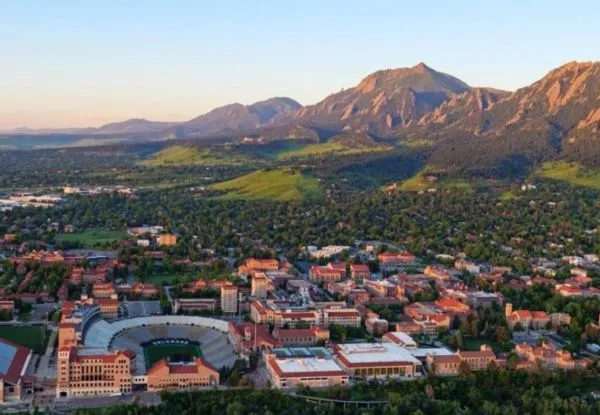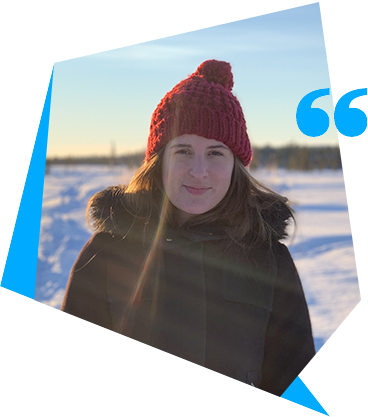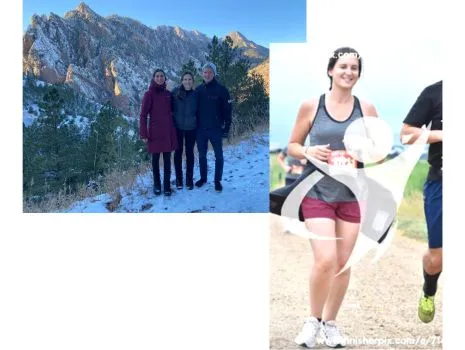< back to articles
5 months of research at the University of Colorado for Estelle
Published on
As part of her ATS Astro Specialized Master’s program, Estelle chose to do a 5-month research internship at the University of Colorado in the USA. Returning a few weeks ago, she tells us about her experience as a Visiting Research Scholar in Boulder.

My academic adventure at the University of Colorado at Boulder was motivated by a profound quest for discovery and exploration in the field of research and academia, and particularly in a different cultural context. The main attraction for me was my passion for the specific field of Active Debris Removal (ADR) and, more generally, my interest in initiatives to preserve space and the Earth’s environment. These fields, combining technological challenges and ecological responsibility, fascinated me and were at the heart of my decision to embark on this rewarding adventure.
Why the University of Colorado?
Estelle Crouzet

The opportunity to work in a leading laboratory in the field of space debris control and removal, surrounded by like-minded researchers and students, was an exciting prospect.
My goal was to immerse myself in a dynamic academic environment where I could not only develop my technical skills and understanding of environmental issues related to space, but also enrich myself with a unique cultural experience.
Choosing the University of Colorado at Boulder, I was looking to take on new challenges, push back the boundaries of my comfort zone, and broaden my perspective on global issues of sustainability and environmental preservation. This decision was also guided by the desire to prepare myself optimally for my future career, by gaining valuable experience and establishing significant professional contacts in the field of space research.
Tell us about your project:
The project I worked on involved a debris deorbiting technique called Ion Beam Shepherd (IBS). IBS technology is an innovative method for managing space debris. This approach allows debris to be moved in a controlled manner, reducing the risk of collisions in space.
In my role on the IBS project, I was completely autonomous. I first carried out an intensive literature search, then ran simulations to test the effectiveness of the technology under various orbital conditions. I analyzed the interaction between ion beams and space debris, assessing the technical challenges and potential of the method. My contributions included implementing an existing model to simulate new application scenarios and interpreting the results to optimize the IBS design. This work has provided additional insights into the practical use of IBS in space debris management.
The results of my work on Ion Beam Shepherd technology have highlighted its significant potential in space debris management. Simulations have shown that IBS can effectively modify debris orbits, with relatively short deorbit times. These results open the way to new strategies for securing the space environment, suggesting that IBS could be a viable solution for the long-term management of space debris.
A few words about your overall experience?
Overall, my academic experience at the University of Colorado has been marked by a deep immersion into the world of space debris research. Joining a renowned laboratory, I was able to work on this innovative project, honing my technical skills and understanding of the complex issues involved in managing space debris.. This experience has enabled me to work on advanced research methodologies, explore new solutions for space debris management and contribute to this crucial field. These demanding but rewarding projects strengthened my passion for research and prepared me for my future role as a research assistant.
This period was also an opportunity to broaden my academic horizons. I attended various research presentations at events at the University of Colorado as well as the thesis defenses of several PhD students in my lab, attended conferences on the topic of law and sustainability in space, and interacted with experts in the field, all of which enriched my academic perspective and opened up new avenues for my research. The stimulating environment at the University of Colorado encouraged me to question, innovate and constantly seek to improve my understanding of space debris challenges.
And on a personal level?
During my stay I experienced a profound cultural and personal transformation. Immediately, I was captivated by the cultural diversity and spirit of the Boulder community. The city, known for its commitment to the environment and sustainability, resonated strongly with my personal values. I was impressed by the abundance of green initiatives, such as local farmers’ markets and ambitious recycling programs, which inspired me to adopt a more sustainable lifestyle.
This period of cultural adaptation was also punctuated by personal challenges. The first few weeks were marked by a feeling of isolation, amplified by the distance from my family and friends, as well as a certain homesickness, having always lived by the sea or ocean and spent all my summers there. Nevertheless, I took initiatives to integrate myself into the local community, participating in cultural events and interacting with people from diverse backgrounds. These experiences contributed greatly to my well-being and helped me overcome homesickness fairly quickly.


Interacting with Boulder locals and other international students was a key part of my experience. I discovered new perspectives and shared unforgettable moments, like the countless hikes I was able to take, which reinforced my love of nature and adventure. I was also able to take part in two races, and a multitude of training sessions in the natural surroundings of my neighborhood.
The encounters I made enriched my understanding of cultural differences and enabled me to develop the flexibility and open-mindedness crucial to my personal and professional development.
To sum up, this American adventure was a period of incomparable personal growth and fulfillment. It enabled me to develop resilience in the face of challenges, forge lasting friendships, and gain a broader perspective on the world, which continues to influence my life and career.
How did your stay go?
The impact of this academic experience extended far beyond the laboratory and my office. She played a decisive role in shaping my professional vision and refining my career goalsThis is particularly true of my aspiration to make a significant contribution not only to the space industry, but also to environmental conservation and humanitarian projects. Thus, the experience I gained at the University of Colorado was fundamental in preparing me for my future role as a research assistant in Humanitarian Technologies. This position, which I’ll be starting in January, is a natural continuation of my academic career, offering an opportunity to apply and broaden my knowledge and skills in a professional setting.
What’s next for you?
I was chosen by the Burleson Global Design Group at the University of Colorado, for a research assistant position aimed at people with a passion for the application of humanitarian technologies. The project, supported by the IEEE Humanitarian Technologies Board, focuses on improving community engagement and the sustainability of humanitarian projects. In this position, I will be responsible for in-depth research activities, preparing and conducting interviews with volunteers who have participated in humanitarian projects, and qualitatively analyzing the data from these interviews and documentary research. I’ll also be involved in writing and publishing conference and journal papers, and will certainly be asked to take part in these conferences. This role offers me a unique opportunity to work on projects with a strong social and environmental impact, which is perfectly in line with the trajectory I wish to pursue.
I’m determined to play a key role in reducing the environmental footprint of space activities. This step represents a springboard towards my long-term goals, enabling me to combine my passion for space research with my commitment to environmental sustainability and social responsibility. In retrospect, my stay at the University of Colorado at Boulder represents a decisive turning point in my personal and professional life. I thank the Foundation and I’m grateful for the opportunities I’ve been given, the friendships I’ve made, and the lessons I’ve learned.